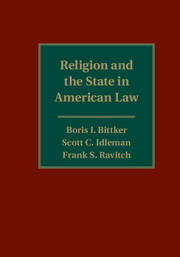Book contents
- Frontmatter
- Dedication
- Contents
- Preface
- 1 History and Introduction
- 2 Church and State in the Nineteenth Century
- 3 Religious Influences and Expressions in Law and Government
- 4 The Establishment Clause
- 5 The Free Exercise Clause
- 6 The Religious Test, Equal Protection, and Free Speech Clauses
- 7 The Definition of Religion
- 8 Church Property Disputes and Church Schisms
- 9 Contracts
- 10 Taxation
- 11 Employment
- 12 Land Use
- 13 Torts
- 14 Criminal Law and Process
- 15 Family Law
- 16 Public Education
- 17 Religious Symbolism on Government Property
- 18 Special Contexts: Prisons and the Military
- Appendix A Federal Constitutional Provisions
- Appendix B State Constitutional Provisions
- Appendix C Selected Federal Statutes 910
- Index
16 - Public Education
Published online by Cambridge University Press: 05 October 2015
- Frontmatter
- Dedication
- Contents
- Preface
- 1 History and Introduction
- 2 Church and State in the Nineteenth Century
- 3 Religious Influences and Expressions in Law and Government
- 4 The Establishment Clause
- 5 The Free Exercise Clause
- 6 The Religious Test, Equal Protection, and Free Speech Clauses
- 7 The Definition of Religion
- 8 Church Property Disputes and Church Schisms
- 9 Contracts
- 10 Taxation
- 11 Employment
- 12 Land Use
- 13 Torts
- 14 Criminal Law and Process
- 15 Family Law
- 16 Public Education
- 17 Religious Symbolism on Government Property
- 18 Special Contexts: Prisons and the Military
- Appendix A Federal Constitutional Provisions
- Appendix B State Constitutional Provisions
- Appendix C Selected Federal Statutes 910
- Index
Summary
Historical Context: Education in the Colonies
Colonial Massachusetts gave public education a firm legal foundation in 1642 by ordering parents to ensure that their children were taught “to read and understand the principles of religion and the capital laws of the country.” As schooling became institutionalized throughout the colonies, teachers were widely required to be persons of “piety and good character,” a provision that was tantamount to a religious test for appointment. Formal education was vastly augmented by the vocational training, including reading and arithmetic (“cyphering”), provided by master craftsmen to their apprentices.
As the avalanche of church-state litigation in the twentieth and twenty-first centuries amply illustrates, education in both public and parochial schools has struggled to come to terms with the remnants of its early religious roots. A leading observer of the status of religion in American education has offered this summary:
God's place within the public schools of the United States has been debatable, and subject to controversy, for as long as there have been public schools. In colonial America, religion played a central role in the schools of every colony, but the understanding of religion differed substantially from colony to colony. With the coming of nationhood and the separation of church and state on the federal level, the public school was pressed into service as a new kind of national church, commissioned to create and carry the common culture and morality of the nation. Since citizens differed dramatically in their definitions of this culture and morality, and especially since newly arrived Catholics, newly freed African Americans, and newly conquered Native Americans all had still other ideas, the content of the nation's common creed – and especially the appropriateness of its more overtly religious dimensions – was a subject of fierce debate and continuing change throughout the nineteenth century.
By the end of that century, due as much to exhaustion as any thoughtful will, schools had dropped the more obviously religious – and generally Protestant Christian – trappings of the school faith, replacing them with a generic commitment to democracy reinforced by a set of patriotic symbols, including flags and flag salutes and the omnipresent pictures of George Washington and Abraham Lincoln. Some religious symbols – bible reading and prayer in a minority of states, Christmas carols and pious references in most communities – continued well into the twentieth century.
- Type
- Chapter
- Information
- Religion and the State in American Law , pp. 746 - 787Publisher: Cambridge University PressPrint publication year: 2015



